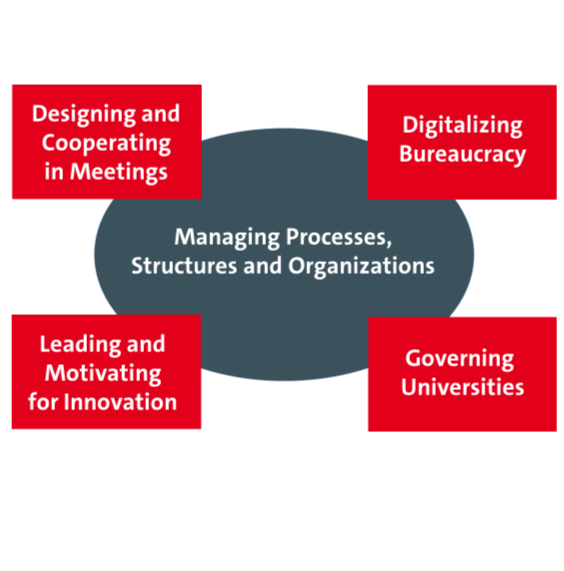Research areas
Designing and Cooperating in Meetings
The COVID-19 Pandemic has prompted changes in how and where we work, exchange ideas, and develop new ones, design meetings, lead teams, coordinate, and collaborate. This proves key to a wealth of opportunities in organizational research: e.g., analyze hybrid work formats and remote work, digital work, online meetings, and virtual teams. We see that the office is still important as the place for face-to-face conversations, direct interaction, exchange of ideas, social connectivity, and embedding. Traditional formats no longer suffice. Organizational governance relies mainly on meetings. The latter may be a powerful organizational tool for creating togetherness across departmental boundaries and hierarchical levels of organizations and companies. Nonetheless, they may also cement rigid hierarchies. We investigate the effects of control arising from hybrid situations in view of the contradictions of distance and proximity, rationality and emotionality, control and self-tuning.
- Agile working in large companies—what are the effects of control in various meeting environments?
Academic guidance for the introduction and implementation of agile project management, scrum in a German DAX company - Work 4.0—generating new ideas in public authorities
Academic guidance for a think tank in a public office which is aiming for innovative solutions and endogenous change
Digitalizing Bureaucracy
To grasp the impact of dysfunctional bureaucracy and administrative burdens, it's beneficial to examine established bureaucratic rules and processes and their effects on individuals. A key focus is on how these rules and processes can be modified, particularly through digitalization, along with the opportunities and risks this presents. Experimental methods allow us to investigate these effects in a nuanced way across different levels, as well as to analyze emotional responses, changes in attitudes, and actual behaviors.
- Digital Transformation—process optimization in public administration
Experimental studies on the effectiveness of digital transformations in actual bureaucratic processes range from apps designed for citizen participation (co-production of public goods) to digital applications in social welfare programs - Emotions in digital bureaucratic processes—physiological measurement of emotional reactions
A series of laboratory experiments is conducted to explore the mechanisms within bureaucratic processes, such as time constraints and administrative pressures, that elicit emotional responses like frustration and anger
Governing Universities
University management and the associated change processes shape governance within these institutions. Existing control logics need to be critically evaluated. While New Public Management is not a one-size-fits-all solution for efficient and effective university governance, it also cannot be seamlessly integrated with other control logics, as doing so would lead to paradoxes for higher education institutions. Governance and control tasks must be structured as multi-level governance, considering the interactions between the macro, meso, and micro levels.
- DFG (German Research Foundation) research group: "Competitive Governance and Configurations of Higher Education Governance. A Qualitative Meta Study" (subproject of the research group proposal "Multiple Competition in the Higher Education System: Actor Constitution, Coordination of Actions, and Consequences" (FR 3600/1-1)
- BMBF (Federal Ministry of Education and Research) joint project: "Performance Evaluation in Science"
Joint project IndiKon, funded by the BMBF (FKZ: 01PY13014A/B) - BMBF joint project: "Multi-Level Governance of Universities"
Joint project RePort, funded by the BMBF (FKZ: 01PW11018A/B)
Leading and Motivating for Innovation
What influence do managers have on their organization’s innovation orientation and the motivation of its members? The fundamental characteristics of executive boards, supervisory boards, and individual managers, along with their implications for organizational design, are examined from a design-oriented perspective. Key questions include: Are diverse management teams more effective at creating organizational frameworks that foster innovation? Do managers need to be authentic to promote ethical awareness among their subordinates? What stereotypical traits are associated with managers in specific industries, and how might staff respond if these assumptions are not met?
The coordination and orientation tasks within organizations are analyzed from a behavior-oriented perspective: What tools do managers utilize to coordinate organizational members? This encompasses leadership styles and negotiation tactics, as well as tangible instruments like contracts and incentive systems. We are particularly interested in how, and to what extent, managers employ performance measurement systems in managing their teams. How can managers balance the conflicting expectations of various stakeholder groups while also pursuing their own agendas? How should cooperation projects be managed to encourage joint learning and prevent unintended knowledge leakage?
- Empirical studies are conducted using a diverse array of methods, including in-depth case studies, observations, and interviews, in addition to large-scale surveys and biographical analyses

